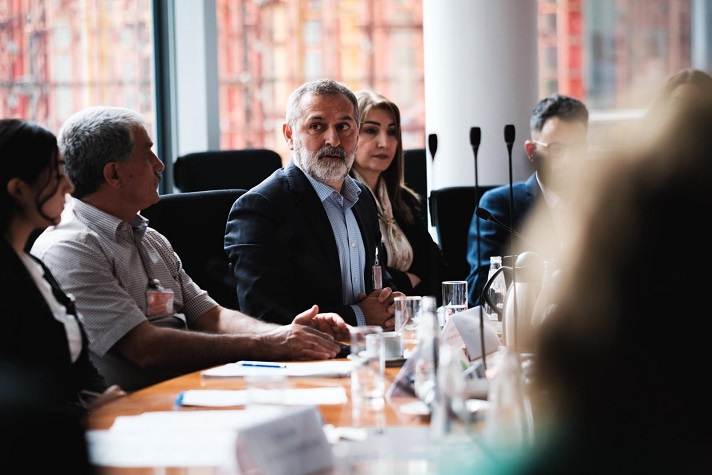Syriac, Kurdish, Druze, Yazidi, and Alawite representatives discuss concerns of repression and exclusion in Syria with Die Linke
BERLIN — Germany’s Left Party (Die Linke) held a roundtable discussion on 24 July to gather information about the situation in Syria. Representatives of smaller indigenous peoples were invited to share their perspectives on the country’s current political, economic, and social landscape, which has been severely affected by years of civil war and the chaotic events after the fall in December of the Ba’ath regime.
After the fall of the Ba’ath regime, hopes for a democratic future in Syria were overshadowed by concerns about the inclusivity of the process spearheaded by Syrian President Ahmad al-Sharaa. Recent developments have underscored significant shortcomings, with representatives from regions and groups unaffiliated with the group making up the current government being mostly excluded from constitutional negotiations and decision-making mechanisms.
The discussion, held in the Bundestag’s Paul-Löbe-Haus, was initiated by Co-Chair of the Left Party leader Jan van Aken and foreign policy spokesperson Cansu Özdemir. Eight representatives of the Syriac (European Syriac Union), Kurdish (Democratic Union Party and Kongra Star), Druze (Pro Asyl), Yazidi and Alawite communities presented their views to the gathered press and politicians.
The representatives visit to Die Linke comes in the wake of the horrific violence in March which targeted the Alawites in western Syria, the terrorist suicide bombing on 22 June of the Mar Elias Church in Daramsuq (Damascus), and this month’s bloody conflict in Suwayda Province that claimed over a thousand lives.
Because of the events in Suwayda the Druze representatives Evlin Assaf and Tareq Alaows (Pro Asyl) were the first to speak after which Metin Rhawi of the European Syriac Union presented his organization’s perspective on Syria.
In her contribution, Assaf called for the construction of a democratic and pluralistic Syria as the best way to do justice to the diverse constellation of indigenous peoples that Syria possesses. In that line, she emphasized the need for the implementation of a federal system as the best political foundation for stability, justice, coexistence, and social cohesion. She also called for urgent humanitarian aid to the areas affected by violence.
Tareq Alaows said that those now supporting the massacres are an Islamist minority among Sunnis. Many Sunnis, both in Syria and the diaspora, do not recognize themselves in the violence against smaller population groups.

ESU Foreign Affairs Representative Metin Rhawi demanded an end to the jihadist, sectarian violence that has ravaged the country in recent months. In this matter, Germany and the international community can put pressure on al-Sharaa and the Syrian government to stop the violence and bring the perpetrators to justice. Rhawi criticized Ahmed al-Sharaa for consistently violating the promises he made to the EU and the US to protect all social groups. “We cannot blindly cooperate with a man who signs his decrees with al-Sharaa but acts like Muhammad al-Jolani.”
“More people want to flee Syria than refugees want to return to their homeland because there is simply no stability,” Rhawi continued. Syria and its current governance lack “diversity and democracy.” This is also reflected in the composition of the current government. He proposed a new UN resolution which can hold Syrian President Ahmad al-Sharaa accountable for his actions and the violence that has happened in the last couple of months.
Rhawi highlighted the Democratic Autonomous Administration of the Region of North and East Syria as a good example for a political and social model for Syria, even the entire Middle East. He made an urgent call for all the different indigenous ethnic and religious peoples of Syria to be recognized and included in the drafting of a new constitution.
Aid to Syria should be directed to those people that really need it.
In conclusion, he called for German and international support of “Syrian forces that defend equality, diversity, civil leadership, and inclusive governance — and reject any attempt to replace one dictatorship with another. Syria needs partners who listen and stand with the people, not rulers who govern through fear.”
Die Linke Foreign policy spokesperson Cansu Özdemir conveyed the Left Party’s point of view: “We support the demands of the different Syrian opposition groups that the massacres must be stopped immediately. The Islamist HTS government must not be normalized, just for Germany to be able to deport people to Syria. This attitude of the German government towards Islamists is devastating for Syria, but also for the entire Middle East.”
Referring to the bloody violence in Suwayda, Özdemir said that the moment has come for Germany and Europe to influence the new Syrian interim president now.
Co-Chair of the Left Party, Jan van Aken, said that he understands that the German government cannot completely avoid negotiations with the government currently seated in Daramsuq (Damascus). However, the German federal government can and should even demand that all civil society groups be able to engage in dialogue with the president, something that has not happened so far, he concluded.
A solidarity march will be held in Berlin on Friday under the motto “Solidarity with the Druze.” The march will lead from the German Ministry of Foreign Affairs via the Brandenburg Gate to the US Embassy.



















